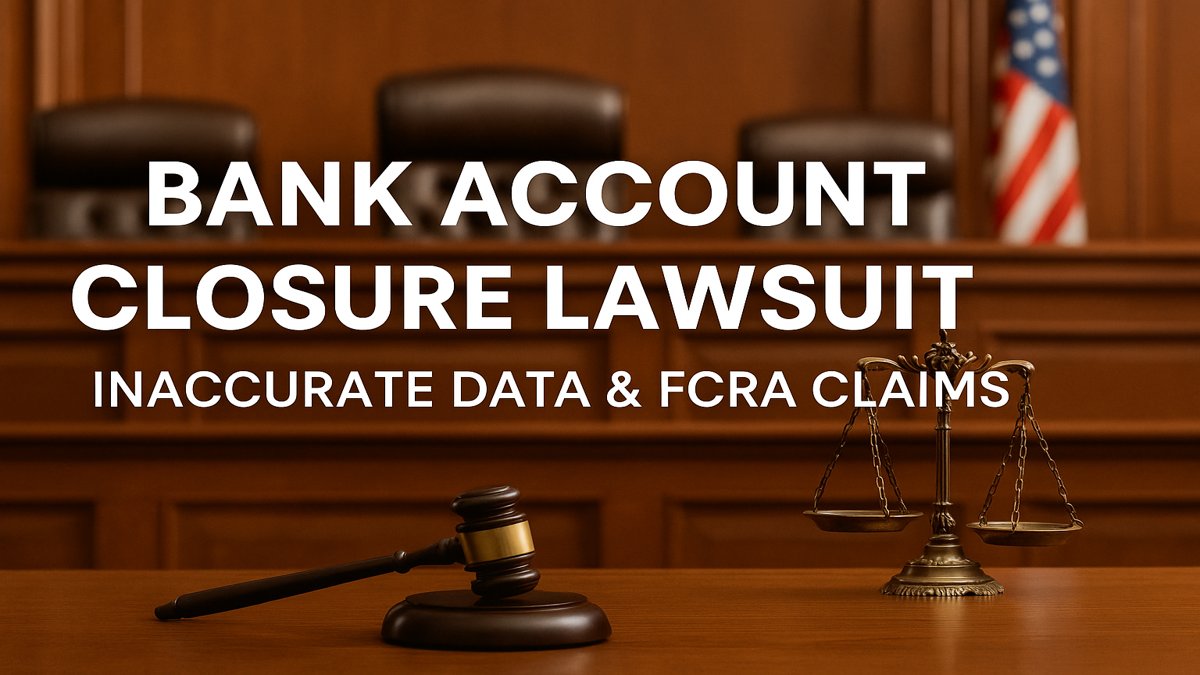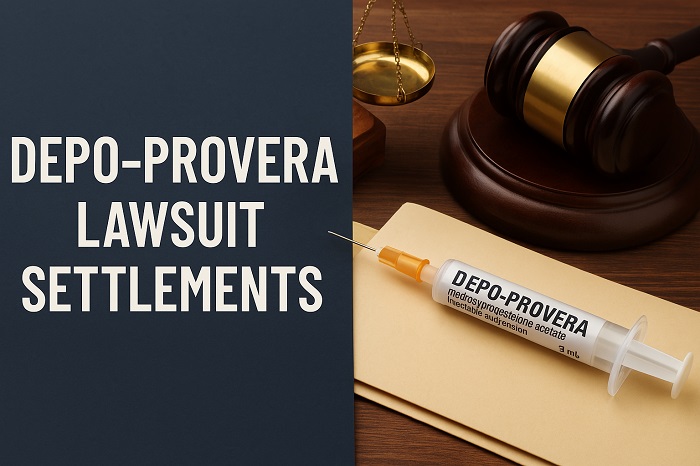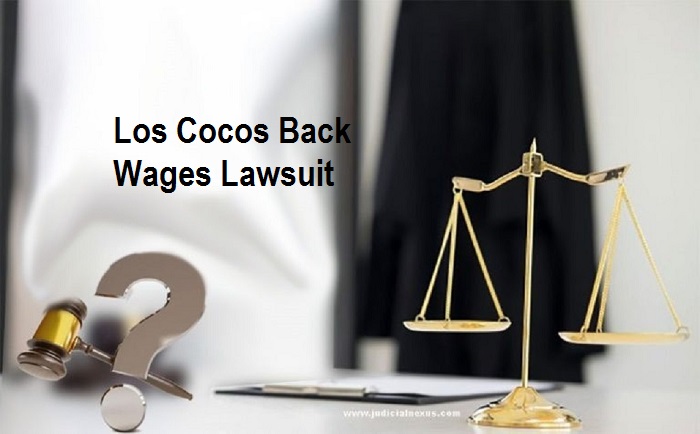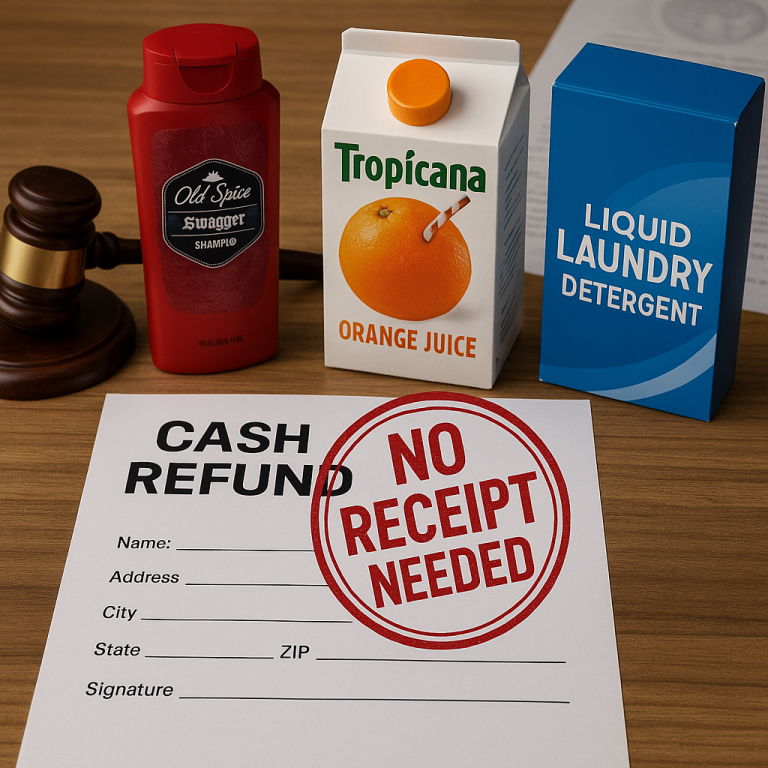Have you heard of the Bank Account Closure Lawsuit? It centers on lawsuits filed in 2024 and 2025 by consumers whose accounts closed without a clear reason and based on inaccurate reports tied to Regulatory DataCorp (RDC), a data broker. The lawsuits allege violations of the Fair Credit Reporting Act (FCRA) because incorrect or mismatched data resulted in account closures that caused financial harm to individuals.
Consumers say banks closed checking, savings, or credit card accounts after getting flawed RDC reports listing them as suspicious. They may never learn why. Some reports pulled public records on people with similar names. Closed accounts blocked access to funds, damaged credit scores, and created barriers. Many plaintiffs had no warnings or chance to correct their records.
Why did people file this lawsuit now?
Are consumers unfairly cut off due to messy data? The lawsuits began to surface in early 2024 and continued into mid‑2025. Plaintiffs filed legal action after facing account closures they say stemmed from flaws in RDC’s system. RDC supplied data to banks, yet customers didn’t have access to that data or chance to fix errors. That left them stuck in limbo without explanation or remedy.
They claim FCRA requires accurate and fair reporting. RDC allegedly linked records based just on a name or weak identifiers, not confirming identity. That made banks act on misleading flags. The lawsuits aim to hold RDC and the banks liable when data errors result in consumer harm.
Who is involved in this lawsuit?
This case brings together individuals who say they were unfairly cut off from their bank accounts and the organizations they believe are responsible. It focuses on both the people taking legal action and the companies that may have used unreliable data to make critical decisions. To understand the full scope, let’s first look at who stepped forward to file the initial claims.
Who sued?
Two individual consumers filed suit in March 2024. They reported bank accounts closed suddenly with no reason and no access to funds. Both claim faulty RDC data harmed their finances and reputation.
Who are the defendants?
Defendants include Regulatory DataCorp (RDC) and the banks that used its reports. Plaintiffs allege banks relied blindly on RDC without verifying data, and RDC failed to protect accuracy and transparency as required by FCRA.
How does the law support their case?
To understand why this lawsuit matters, it helps to know what the law actually says about your rights. When banks or data companies act on flawed information, the consequences can be serious. That’s where federal protections come in—especially those under the Fair Credit Reporting Act. Let’s break down what those protections include.
What legal protections exist under FCRA?
The FCRA offers rights when consumer data contributes to adverse actions. It entitles you to know what triggered a closure and to receive a copy of the report used. It guarantees accuracy and fairness. If those rights break, the law lets you seek damages.
Why does RDC’s method matter?
The lawsuits say RDC used sloppy matching. Their system may have linked your record to public data belonging to someone else with a similar name. That resulted in false flags. FCRA demands companies correct or update errors. Plaintiffs say they never got a chance to challenge the report before action happened.
What harm did impacted individuals face?
Customers describe sudden account closures, blocked access to funds, and no notice. That impacted bills, rent, and credit. Some lost access to payroll deposits. Others couldn’t open new accounts for days. They also couldn’t easily clear their names because banks and RDC provided no explanation or access to the data used.
How does this fit broader trends in de‑banking lawsuits?
In recent years regulators and lawsuits have taken aim at “de‑banking” or closing accounts with minimal notice.
In the UK, Nigel Farage’s account closure at Coutts sparked public debate about ethics and politics in banking. That event prompted new UK rules requiring banks to give 90 days notice and a written explanation before closing current accounts, coming into force April 2026. Roughly 500,000 accounts closed without explanation in 2023‑24. FOS (Financial Ombudsman Service) has recommended compensation in mistaken closures. That shows a growing legal and regulatory push for transparency.
In the US, similar concerns appear though mostly through lawsuits and complaints—not formal regulation yet. People face closures due to opaque bank algorithms. These cases show how data brokers and banks play roles in wrongful de‑banking.
Who may qualify to join this lawsuit?
If you experienced sudden account closure without a clear reason, especially if the closure followed a suspicious activity flag but you never received a copy of a report or explanation, you may qualify.
You might also join if:
- A name mis‑match or identity confusion seems to have triggered the closure.
- A bank refused to share what triggered the closure.
- You lost access to funds or opened new accounts later than planned.
Those conditions suggest a case under FCRA may apply.
What outcomes could emerge from this case?
If plaintiffs succeed, possible outcomes include:
- Monetary damages for emotional distress, lost interest, missed opportunities.
- Statutory damages under FCRA: up to $1,000 per violation, plus court costs and attorneys’ fees.
- Directive for banks and RDC to revise practices, improve transparency, and ensure consumers can access and dispute reports.
If the case expands, it could trigger wider reform. Banks may adopt better notification habits. Data brokers may tighten matching criteria to avoid wrongful closures.
How can you take steps now?
Ask yourself:
- Did a bank close your account without clear reason or notice?
- Did the bank rely on “suspicious activity” without giving details?
- Did you request a copy of the credit or data report and get none?
- Did you lose access to funds or face financial impact from the closure?
If yes, you can contact a firm specializing in FCRA cases for a free consultation. Gather documents: bank notices, denial letters, correspondence. Those help build your case. Many firms work on contingency, so you don’t pay upfront. You only pay if you win.
What does the timeline look like ahead?
This case is still early. Plaintiffs filed in March 2024 and 2025. Expect these steps:
- Lawsuit motions about class status.
- Discovery on RDC’s matching methods and bank reliance.
- Fact gathering and depositions.
- Potential class or collective designation if more people qualify.
- Settlement talks or trial.
If the case moves forward, it may run through 2026. If courts find systemic error, outcomes could affect many consumers and shape bank policies.
Key facts
| Question | Answer |
|---|---|
| What is the lawsuit? | Bank Account Closure Lawsuit over data-driven closures without explanation |
| Who filed? | Two consumers whose accounts closed unexpectedly in 2024–25 |
| Who is sued? | Regulatory DataCorp and banks using its reports |
| What’s alleged? | FCRA violations due to inaccurate consumer data and lack of notice |
| Who qualifies? | Consumers whose accounts closed without explanation, lost access, and no report access |
| Possible remedies? | Statutory and actual damages, court costs, attorney fees, policy change |
| Legal basis? | Fair Credit Reporting Act requirements for accuracy and notice |
| How to act? | Review closure notices, request data reports, consult legal counsel |
What questions should you ask a legal advisor?
Consider asking:
- How do you prove RDC’s matching methods caused closure?
- What damages can I claim under FCRA?
- Can I recover emotional distress or lost interest?
- What records or bank communications should I gather?
- How long could the case take?
- What if my closure happened outside the US?
- What costs apply if I join?
Those questions help you evaluate working with counsel and understand your case.
Why does this matter?
Bank Account Closure Lawsuit stands at the junction of consumer rights, data accuracy, and banking transparency. More people report unexplained account closures. Without legal pushback, banks and data brokers may continue opaque processes. Success here may force banks to warn customers, share underlying reports, and reduce mistakes. People affected by forced account closures would benefit. Others could see stronger protections across the banking system.
What should you expect next?
Watch for:
- Class certification decisions and court filings on RDC’s practices.
- Public disclosures about matching criteria or data protocols.
- Uptick in consumer demand for data transparency.
- Press coverage highlighting stories similar to those behind the case.
- Information from law firms offering intake for consumers impacted by closures.
What can you do now?
If a bank closed your account unexpectedly and you didn’t get a copy of the report used or a clear reason, your rights may have broken under FCRA. You can act now:
- Request explanations from banks.
- Submit subject access requests for data.
- Contact an attorney specializing in consumer data law.
- Gather bank statements, closure notices, and any communication.
The Bank Account Closure Lawsuit may offer a path to recover losses, prevent future harm, and hold providers accountable. If your situation fits, consider taking steps today.
Ayesha Awais is a content writer for JudicialNexus.com, covering accident reports, injury-related news, lawsuits, and public safety updates. All content is informational in nature and based on publicly available sources.




